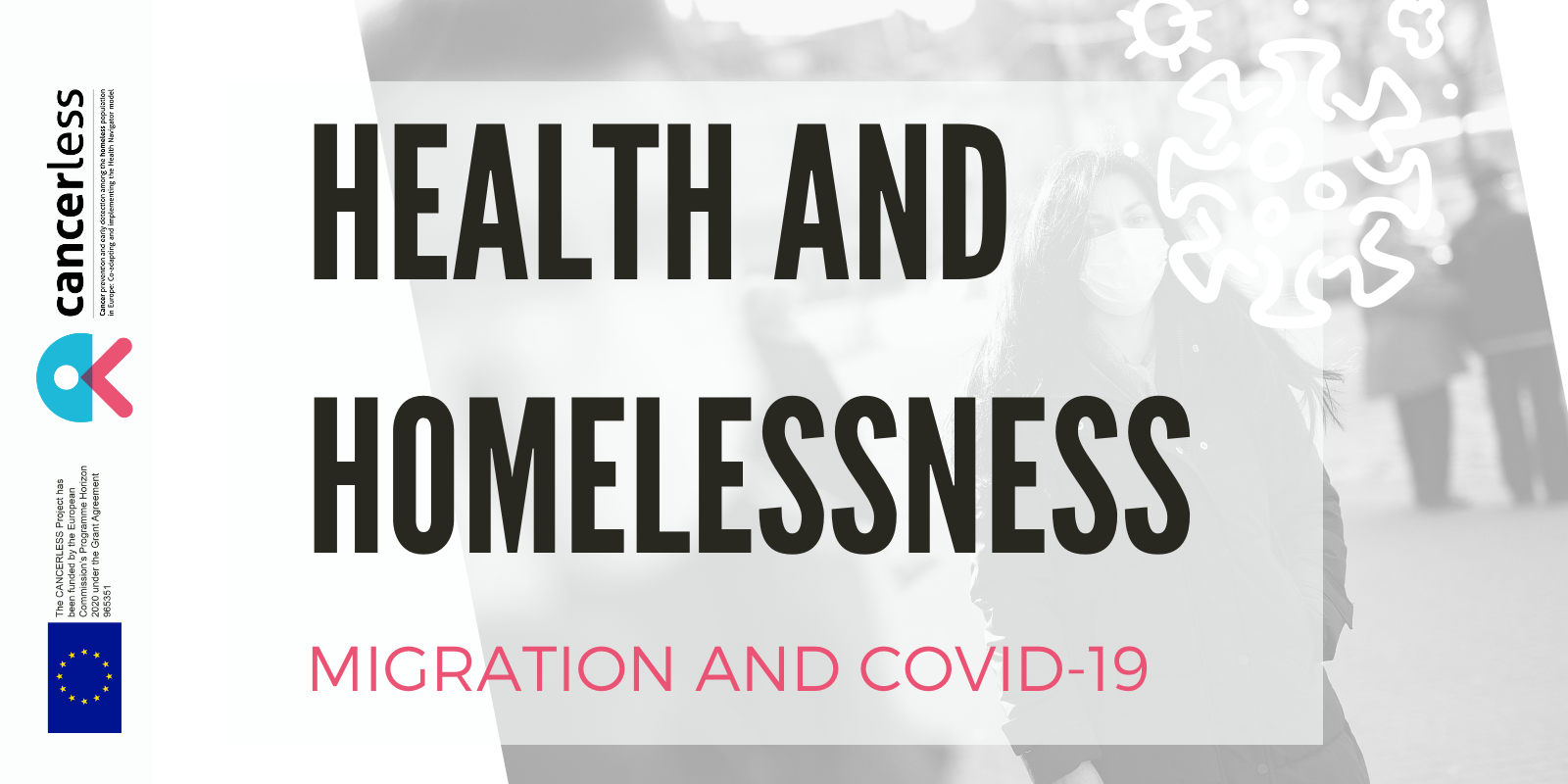Last month, we discussed the relationship between immigration and homelessness describing the general challenges in health care access and providing recommendations on how to reach this complex target group. Remaining on the same topic, this month the CANCERLESS blog will focus on the impact of the COVID-19 pandemic on migrants experiencing homelessness in Europe.
Homeless migrants in the EU: Challenges during the COVID-19 pandemic
Migrants, including both EU citizens who move within the EU for various reasons mainly economic and non-EU citizens, are often highly represented among rough sleepers in large European cities. Because a lack of integration and restrictive immigration rules, non-EU national who are newcomers are usually found on the streets. Homeless people with a migrant background often seek care in in homeless services which offer basic support and counselling. However, the COVID-19 pandemic has created further challenges in terms of accessing adequate housing as well as health and care services, while many support and care services provided had to be closed with countries’ lockdown.
This pandemic has added an extra burden to the organizations offering services to homeless peoples, like for instance limited availability for night shelters – on top of limitations in the number of people who could be accommodated– or even problems in the social and healthcare related work their staff could perform due to COVID-19 restrictions. Additionally, receiving communications on COVID-19 in a language they understand has been another limitation that some groups have faced in the host societies. Furthermore, irregular migrants can find more difficult to access health, care and support services for fear of being reported as they need to be registered.
Chances the pandemic created: new opportunities for homeless migrants
In February 2021, the European Federation of National Organisations Working with the Homeless (FEANTSA) released a report summarizing – among other things – best practices implemented by EU governments to tackle challenges the pandemic brought for homeless migrants prior to and after the 1st lockdown. Data were collected over the Summer of 2020 (July – September). Governments from Ireland, Denmark, Germany, Poland, UK, France and Portugal stepped up with policies and public health initiatives like opening extra night shelters or facilitating access to hotels and hostels, allowing through this way everyone to access accommodation during the 1st wave of this global health crisis. The most important factor highlighted in the report was that access to homeless services was no longer conditional on immigration status. In this context, authorities and relevant stakeholders and service providers were able to closely observe practices that not only helped a migrant out of homelessness but also provided them with access to vital healthcare services and counseling to protected them against Covid-19.
From lessons-learned in the pandemic to overall health prevention strategies: Practical considerations and conclusions
“Leaving no one behind” is the central, transformative promise of the 2030 Agenda and its sustainable development goals set by the United Nations Sustainable Development group, even more when it comes to prevention and management of health issues on a public health basis. The pandemic has definitely aggravated the disadvantaged living conditions of migrants across Europe especially those who are homeless. Nevertheless, this pandemic has revealed some important and beneficial public health policies, initiatives, and practices for this target group, showing ways in which homeless migrants can benefit and improve their circumstances during a global health crisis. It is positive that health services as well as organizations active with homeless and migrant populations and their personnel adapted their services to effectively address the needs of this population during the pandemic. At the same time, they had to provide health education to disadvantaged population on how to protect themselves as well as their community. Thereby, the pandemic revealed that achieving social and health rights for all is feasible and achievable, as long as there is willingness and support.
This is the approach followed by the CANCERLESS project where the Health Navigator Model is tailor-made to address the special needs of people experiencing homelessness to provide professionals and all relevant stakeholders with skills, capabilities, and qualifications so as to adapt their services to different circumstances like the pandemic to effectively prevent cancer and facilitate access to screening services in this specific population.
References
European Federation of National Organisations Working with the Homeless (FEANTSA) The Impact of Covid-19 on Homeless Service Providers & Homeless People: The Migrant Perspective. Report. February 2021. Available at: https://bischof-hermann-stiftung.de/fileadmin/user_upload/Report_Cov19___migrants.pdf
Ralli, M., Cedola, C., Urbano, S., Morrone, A., & Ercoli, L. (2020). Homeless persons and migrants in precarious housing conditions and COVID-19 pandemic: peculiarities and prevention strategies. European review for medical and pharmacological sciences, 24(18), 9765–9767. https://doi.org/10.26355/eurrev_202009_23071
United Nations Sustainable Development Group. Universal Values Principle Two: Leave No One Behind. Available at: https://unsdg.un.org/2030-agenda/universal-values/leave-no-one-behind

